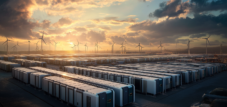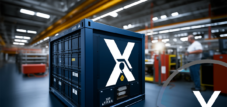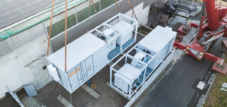Germany relies on energy storage: insights into home storage, commercial storage and large-scale storage solutions
Xpert pre-release
Language selection 📢
Published on: December 22, 2024 / update from: December 22, 2024 - Author: Konrad Wolfenstein

Germany relies on energy storage: insights into home storage, commercial storage and large-scale storage solutions - creative image: Xpert.Digital
Germany relies on energy storage: insights into home storage, commercial storage and large-scale storage solutions
Germany has positioned itself as a pioneer in the energy transition, and a central part of this transformation is energy storage. Batteries, used in households as well as in commercial and industrial establishments as well as in large infrastructure projects, play a crucial role. With the increasing use of renewable energies such as solar and wind energy, which naturally have fluctuating availability, energy storage is becoming increasingly important in all sectors.
The role of home storage: decentralization of energy supply
The latest figures from December 2024 show that there are around 1.66 million registered battery storage systems in Germany. The majority of these systems are home storage systems with capacities of up to 30 kilowatt hours. These storage systems allow households to temporarily store excess electricity generated by solar systems and use it when needed. This not only increases independence from rising electricity prices, but also makes a valuable contribution to stabilizing the electricity network.
With a total capacity of an impressive 12.6 gigawatt hours (GWh), home storage systems represent the largest part of the installed storage capacity in Germany. This shows that private households play a key role in the energy transition. Battery storage is an increasingly attractive investment for homeowners, especially in combination with government funding programs such as the KfW loan program or regional subsidies.
Dynamic home storage market in Europe
In a European comparison, Germany remains the leading market for home storage. Forecasts for 2024 assume an increase of 11 gigawatt hours of home storage capacity in Europe. Germany and Italy are the largest markets. This trend highlights the growing importance of home storage in Europe, especially in countries that rely heavily on solar energy.
The high demand for home storage in Germany is supported by several factors:
- Rising energy costs: More and more households are looking for ways to increase their energy independence.
- Technological advances: Advances in the efficiency and lifespan of lithium-ion batteries have significantly increased the attractiveness of storage.
- Political framework: The federal government has set clear goals for decarbonizing the energy sector, which promotes investments in renewable energies and storage technologies.
Commercial storage: flexibility and cost-effectiveness for companies
In addition to home storage, commercial storage is also playing an increasingly important role. These systems, which typically have capacities between 30 kilowatt hours and several megawatt hours, are used by companies to reduce load peaks, reduce energy costs and ensure security of supply. Commercial storage systems enable companies to increase their own consumption rate and become less dependent on price fluctuations on the electricity market.
In addition, commercial storage contributes to grid stability by providing frequency control and balancing services. Many companies also use their storage in virtual power plants, where numerous decentralized energy sources and storage are interconnected to support grid stability and generate additional income through participation in the energy market.
Large-scale storage: cornerstone of the energy transition
Large-scale storage systems, which often have capacities in the double-digit megawatt-hour range or beyond, are a central building block for the energy transition. They are usually used in combination with solar or wind farms and make it possible to store excess energy and later feed it into the grid. This is particularly important to offset the volatility of renewable energy.
A prominent example is the use of large-scale storage to stabilize the power grid. As the share of renewable energy in the grid increases, it becomes increasingly important to compensate for short-term fluctuations. Large-scale storage systems can react to network fluctuations in fractions of a second and thus contribute to security of supply.
Technological developments and challenges
The energy storage industry is facing rapid technological progress. Lithium-ion batteries currently dominate the market, but alternative technologies such as solid-state batteries, redox flow batteries or hydrogen storage are becoming increasingly important. These technologies potentially offer higher energy densities, longer lifetimes and lower costs.
However, one of the biggest challenges remains the supply of raw materials. Lithium, cobalt and nickel, the central components of many current battery systems, are in limited supply and are often associated with ecological and social challenges in extraction. Recycling and the development of technologies that require less critical materials are therefore key research priorities.
Economic and ecological benefits
Energy management systems and storage solutions not only offer economic advantages, but also make a significant contribution to climate protection. By storing renewable electricity, the use of fossil energy can be reduced. At the same time, storage promotes decentralized energy production and helps to relieve the load on the power grid.
In addition, energy storage also offers protection against power outages. These systems are becoming increasingly important, particularly in times of increasing weather extremes caused by climate change.
The path to a sustainable future
The future of energy storage in Germany and Europe looks promising. With further investments in research and development as well as the continuous improvement of the political framework, energy storage technology could play an even greater role. Germany has the opportunity to expand its leading position in this area and serve as a role model for other countries.
The combination of home storage, commercial storage and large-scale storage forms a comprehensive system that forms the basis for a sustainable and climate-friendly energy supply. Through innovative business models, advanced technologies and a clear vision for the future, the energy storage industry can make a decisive contribution to the global energy transition.
With constant progress and increasing acceptance in society, Germany is facing a new phase of the energy transition in which storage technologies will play the central role. Successfully implementing this change will not only create economic opportunities, but also contribute to the global fight against climate change.
Suitable for:
🎯🎯🎯 Benefit from Xpert.Digital's extensive, fivefold expertise in a comprehensive service package | R&D, XR, PR & SEM

AI & XR 3D Rendering Machine: Fivefold expertise from Xpert.Digital in a comprehensive service package, R&D XR, PR & SEM - Image: Xpert.Digital
Xpert.Digital has in-depth knowledge of various industries. This allows us to develop tailor-made strategies that are tailored precisely to the requirements and challenges of your specific market segment. By continually analyzing market trends and following industry developments, we can act with foresight and offer innovative solutions. Through the combination of experience and knowledge, we generate added value and give our customers a decisive competitive advantage.
More about it here:
Current status and importance of energy storage in Germany
Germany is increasingly relying on the use of energy storage in order to successfully advance the energy transition and continuously increase the share of renewable energies in the electricity mix. “A sustainable energy supply is hardly conceivable without efficient storage solutions,” is the conclusion of many experts who work on this topic. Home storage, commercial storage and large storage each play an important role. Below we take a detailed look at current developments, summarizing technical backgrounds, market trends and perspectives in order to draw a comprehensive picture of the energy storage landscape in Germany.
Suitable for:
Development and distribution of home storage systems
The most current available data has been available since December 17, 2024, which illustrates how dynamically the market has developed: Around 1.66 million registered battery storage systems are registered in Germany, with the majority of these storage systems being privately installed solutions with a capacity of up to 30 kilowatt hours. This rapid growth in the area of decentralized energy storage has accelerated in recent years. Private households that decide to combine a solar system with appropriate storage benefit from this in several ways. On the one hand, home storage systems enable better use of the solar power you generate yourself, and on the other hand, they ensure stability in your own power supply. Another incentive is the financial benefits that can arise - if you maximize your own consumption, your dependence on electricity from the grid decreases.
The total capacity of all home storage systems in Germany now significantly exceeds that of large storage systems. The small storage systems in private households alone already have a total capacity of 12.6 gigawatt hours (GWh). This number illustrates the crucial contribution that private households make to the energy transition. While large-scale storage systems are usually operated by energy suppliers or industrial companies and are used to compensate for network frequency fluctuations or to stabilize the power grid, the numerous decentralized home storage systems are the backbone of a bottom-up driven energy transition: citizens decide to actively invest in photovoltaic systems and battery storage to generate and store part of their energy independently.
Germany's role in the European home storage market
In a European comparison, Germany stands out as one of the most important markets for home storage. An additional 11 gigawatt hours of home storage was expected across Europe in 2024. “Germany and Italy are considered the two largest markets for household storage in Europe,” according to some industry observers. This is due, among other things, to the funding instruments that have already been established in both countries, as well as the comparatively high electricity prices, which make the economical operation of such storage solutions attractive for private individuals. In addition, both countries have very ambitious goals for the integration of renewable energies, which is intensively pushing forward solar and storage projects.
Suitable for:
Commercial storage as flexible solutions for companies
In addition to home storage systems, there are a variety of medium-sized energy storage systems that are often used in commercial businesses. Such commercial storage systems often have an output of between 30 and a few hundred kilowatt hours and can be precisely integrated into existing operating concepts. For example, craft businesses, medium-sized companies and agricultural businesses are increasingly relying on hybrid systems consisting of photovoltaic systems, small wind turbines or combined heat and power plants with associated battery storage. The advantage is obvious: peak loads can be absorbed, higher self-consumption rates can be achieved and electricity costs can be reduced. These storage solutions also offer options for emergency power supply if short-term bottlenecks occur on the grid. This means that a company's energy supply becomes more reliable and predictable, while operating costs can also be significantly reduced.
Large-scale storage as stabilizers of the power grid
Large storage solutions play a different but equally important role. Their main purpose is to compensate for frequency fluctuations by feeding or absorbing energy into the network every second. Especially in times when the share of renewable energies fluctuates greatly - for example when the wind blows very strongly or solar radiation suddenly decreases - large buffers are essential to keep the grid frequency stable. Such systems often reach capacities in the megawatt-hour to gigawatt-hour range and require significant investments in construction. Nevertheless, they are considered an important component of the energy transition, especially if the share of solar and wind power continues to increase. Without battery storage and other storage technologies, blackout-like situations could arise if, for example, several gigawatts of solar power suddenly drop.
Diversity of technologies in memory development
An exciting aspect of this development lies in the technological diversity of storage solutions. Numerous home storage systems currently rely on lithium-ion technology. This has established itself as the market leader in recent years due to its high energy density, comparatively long service life and falling prices. However, there are also other approaches, such as redox flow batteries, which work with liquid electrolytes and are characterized by easy scalability, although they have so far been less widespread. In some cases, lithium-ion batteries are also used for large-scale industrial storage, but in some cases people are trying out alternative battery types in order to avoid raw material shortages or recycling problems. Hydrogen is also becoming increasingly important as an energy storage device, especially in sectors where direct electrification is not always practical, such as heavy industry or transport.
Vehicle-to-grid concepts: potential of electromobility
What is also interesting is the possibility that electric cars will be increasingly integrated into the energy system in the future. With vehicle-to-grid concepts (V2G), the energy stored in the batteries of electric cars could be temporarily fed back into the grid. While the main focus at the moment is to cover personal consumption and reduce peak loads when charging, the future perspective is that the millions of electric cars in Germany will function as decentralized, mobile storage devices. This could further stabilize the overall structure of the power grid, as the majority of vehicles are parked at night or at work and would therefore have time to release or absorb energy into the grid in order to compensate for bottlenecks.
Political and legal framework for energy storage
In addition to the technological aspects and the sheer number of storage systems installed, the political and legal framework plays an important role. Germany has had funding programs for photovoltaic systems and storage solutions that have been established for years, with the conditions being continually adjusted. Such measures often include low-interest loans, repayment subsidies or direct investment subsidies and are popular with private individuals, businesses or public institutions. In addition, it is important to simplify bureaucratic hurdles and speed up approval procedures in order to enable the expansion of the charging and storage infrastructure across the board. The attractiveness of self-consumption is also fueled by constantly rising electricity prices, which increase the economic advantage of independence from the electricity market.
Challenges in taking back and recycling lithium-ion batteries
However, there are also challenges that still need to be overcome. This includes the long-term take-back and recycling of lithium-ion batteries, as it must be ensured that the materials used are cleanly processed. Raw materials such as lithium and cobalt are difficult to access in some regions of the world and pose ecological and social risks when mined. Manufacturers and politicians are required to develop strategies for the recycling and reuse of battery cells so that tomorrow's energy storage systems are truly sustainable. Current efforts aim to better recycle battery-compatible raw materials, set up take-back systems and intensify research into alternative cell chemistries.
Safety of lithium-ion batteries and their operation
Another issue in the energy storage environment is safety. Lithium-ion batteries in particular should be treated carefully during installation and operation to minimize the risk of fire or other accidents. Users are therefore encouraged to observe quality seals and to rely on professional installation by specialist companies. Modern home storage systems and their components usually have extensive security mechanisms and monitoring systems that can detect critical conditions in a timely manner and initiate countermeasures. Energy suppliers and network operators also attach great importance to appropriate certifications in order to maintain compatibility standards when connecting to the network.
Economic opportunities through energy storage technologies
At the same time, energy storage offers economic opportunities for Germany. Many companies from mechanical engineering, electrical engineering and the chemical industry are involved in the value chain surrounding battery and storage technologies. From material extraction to cell production to system integration and maintenance, new jobs and innovation clusters are being created. The federal government and various federal states have therefore launched special programs to support research and development in this field. Examples include pilot plants for cell production, research centers for hydrogen storage and test fields for smart grid integration.
Technological advances for private households
Last but not least, private households that have decided on storage early on also benefit from technological advances. Many newer system generations have a modular structure and can be expanded as demand increases. In addition, the price per kilowatt hour of storage capacity usually falls from year to year, which continues to make it attractive to start storing solar power. This means that even more people will be interested in finding their own solution for the domestic energy transition in the future. “The future belongs to those who empower themselves to be part of the solution,” say some supporters of decentralized energy supply.
European perspectives on the expansion of energy storage
If you look beyond Germany's borders, you can see that other European countries are also accelerating the expansion of their energy storage capacities. According to various market observations, Italy, Spain, France and the United Kingdom are recording increasing interest among households and companies in investing in battery systems. The motivation here may differ: While in some countries there is a strong focus on climate goals, elsewhere economic aspects and a sometimes dilapidated network infrastructure motivate the expansion of decentralized storage. Nevertheless, a basic idea runs through many countries: energy storage is an increasingly indispensable part of achieving the transformation towards climate neutrality in the coming decades.
Large-scale projects with battery storage: flexibility and cost-effectiveness
There is also a trend towards planning battery storage directly in large-scale renewable energy projects. This creates solar or wind farms that, in combination with large batteries, can shift the electricity generated over time. Instead of having to sell excess production for little money due to peak loads in certain hours, electricity is fed in when it is paid for higher on the market or when the grid needs support. In the long term, this trend will lead to greater flexibility and cost-effectiveness of renewable energies. Taken together, all of these different storage options – from the home garage to the huge battery park – create the backbone of a modern, green power supply.
Growth of energy storage in Germany and Europe
In summary, it can be said that the growth of energy storage in Germany is increasing impressively and is establishing itself in a wide variety of areas. The 1.66 million registered battery storage units as of December 2024 underline how strongly the market is driven by private individuals, while large storage solutions remain essential to stabilizing the grid. A total capacity of 12.6 GWh in home storage alone illustrates the sum of many small storage units that together make a decisive contribution to the energy transition. In the European context, Germany remains at the forefront, together with Italy, when it comes to the development of household storage systems.
Innovations and sustainable energy systems of the future
The market will continue to develop in the coming years through continuous innovation, improved funding programs and the constant development of battery technology. Alternative storage technologies such as redox flow batteries, hydrogen or other chemical storage may become increasingly important. At the same time, the trend towards comprehensive system solutions by combining several technologies will increase. The potential of vehicle-to-grid applications is particularly exciting, in which electric cars could become an important component in decentralized energy buffering.
All of this shows that the energy future in Germany and Europe requires pragmatic but future-oriented approaches in order to reconcile security of supply and climate protection. Private households, commercial businesses and large companies are jointly required to continually modernize the energy system and supplement it with innovative measures. Energy storage is the key to a high proportion of renewable energies and therefore an important step towards climate neutrality. Given the rapid developments, it is expected that the number of installed battery storage systems will continue to rise sharply in the coming years and that the technologies for sustainable energy supply will find ever wider application and acceptance.
We are there for you - advice - planning - implementation - project management
☑️ SME support in strategy, consulting, planning and implementation
☑️ Creation or realignment of the digital strategy and digitalization
☑️ Expansion and optimization of international sales processes
☑️ Global & Digital B2B trading platforms
☑️ Pioneer Business Development
I would be happy to serve as your personal advisor.
You can contact me by filling out the contact form below or simply call me on +49 89 89 674 804 (Munich) .
I'm looking forward to our joint project.
Xpert.Digital - Konrad Wolfenstein
Xpert.Digital is a hub for industry with a focus on digitalization, mechanical engineering, logistics/intralogistics and photovoltaics.
With our 360° business development solution, we support well-known companies from new business to after sales.
Market intelligence, smarketing, marketing automation, content development, PR, mail campaigns, personalized social media and lead nurturing are part of our digital tools.
You can find out more at: www.xpert.digital - www.xpert.solar - www.xpert.plus























